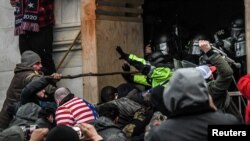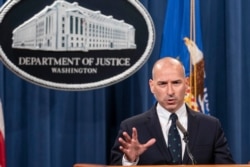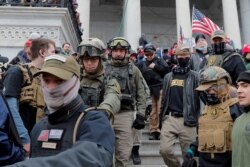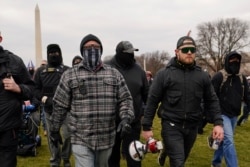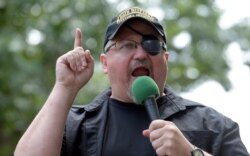Since launching a wide-ranging investigation into the U.S. Capitol riot nearly three months ago, federal prosecutors have charged nearly 400 participants in the bloody insurrection with a variety of charges.
That represents about half of the estimated 800 supporters of former President Donald Trump who breached the complex on January 6 in an effort to prevent Congress from certifying President Joe Biden’s victory over Trump in the November election.
With newly confirmed Attorney General Merrick Garland declaring this his top priority, the government is conducting what has been touted as the largest federal criminal investigation in U.S. history involving hundreds of FBI agents and prosecutors.
The charges range from simple trespassing to assaulting police officers. Nearly 150 involve illegal entry of the Capitol. More than 100 people have been charged with assaulting police officers, including one who subsequently died, according to prosecutors.
But by far the most serious charges have been brought against three dozen or so members of three far-right groups: Oath Keepers, Three Percenters and the Proud Boys. The charges range from conspiracy to obstruction of an official proceeding. Some have pleaded not guilty while others’ lawyers have denied the charges.
More serious charge
Now, prosecutors are increasingly focused on building the conspiracy cases and considering upping the ante by bringing the little-used but far more serious charges of “seditious conspiracy,” which carry up to 20 years in prison, according to current and former law enforcement officials.
In an interview that aired on Sunday, federal prosecutor Michael Sherwin, who until last week headed the investigation, told the CBS News program “60 Minutes” that the “evidence is trending toward” bringing seditious conspiracy charges.
“I believe the facts do support those charges,” Sherwin said. “And I think that as we go forward, more facts will support that.”
A seditious conspiracy is defined in federal law as two or more people plotting together to use force to overthrow the U.S. government, oppose its authority or “prevent, hinder, or delay the execution of any law of the United States.”
Given the unprecedented nature of the attack on the U.S. Capitol, the seat of the U.S. legislative government, prosecutors began looking into seditious conspiracy charges almost from the start, with Sherwin telling reporters in late January that the “results will bear fruit very soon.”
Easier cases
But during the first few weeks of the probe, Sherwin’s investigators chiefly focused on what some called the “low hanging fruit” cases — rioters such as the man carrying a “Camp Auschwitz” sign seen in viral social media videos rampaging through the Capitol. The effort proved largely successful, with nearly 100 arrests made by the time of Biden’s inauguration on January 20, according to Sherwin.
David Gomez, a retired FBI agent and counterterrorism executive with the bureau, said what makes the investigation so complex is the fact that the rioters came from across the country.
"So you have offices that normally wouldn't be involved in these type of investigations having to rally their agents to look into and find participants and potential suspects in the assault on the Capitol," Gomez said.
With all but a handful of the most notorious rioters arrested, investigators have shifted their focus in recent weeks to the Oath Keepers and other extremists who plotted the attack for a variety of reasons.
Now, prosecutors are looking for rioters who conspired to overthrow the government, said Sherine Ebadi, a former FBI special agent who is now an associate managing director at Kroll, an international investigative agency.
“That's sort of the heart and soul of this investigation,” said Ebadi, who served as the lead case agent during the special counsel investigation of former Trump campaign manager Paul Manafort.
While investigating rioters who breached the Capitol and destroyed property is important, Ebadi said, “what they're really concerned about is the conspiracy to overthrow the government or to commit acts of sedition.”
But whether prosecutors can prove seditious conspiracy remains an open question. The burden of proof is steep. To prove the charge, prosecutors must demonstrate that a group of individuals conspired with one another to violently overthrow the government.
International terrorists, not domestic
In recent decades, the Justice Department has successfully prosecuted several international terrorists on seditious conspiracy charges. But it has had less success in using the seditious conspiracy statute against domestic extremists.
So far, prosecutors have built at least two major conspiracy cases related to the Capitol attack.
The first involves a group of 10 members of the Oath Keepers, described by the Anti-Defamation League as “a large but loosely organized collection of right-wing anti-government extremists who are part of the militia movement.”
The group, including five military veterans and one former law enforcement officer, is accused of coordinating and planning the attack in encrypted chats weeks in advance of January 6. Prosecutors say seven of the 10 were part of a military-style stack formation that dressed in paramilitary gear and forced their way into the Capitol. They face multiple criminal charges, including conspiracy, obstruction of an official proceeding, and destruction of government property.
The second conspiracy case involves four leaders of the Proud Boys, a self-described club of “Western chauvinists” known for their street brawls with members of the anti-fascist movement known as antifa.
Three of the quartet, including Ethan Nordean, president of the Proud Boys’ Washington state chapter, allegedly stormed the Capitol before celebrating the attack on social media and encrypted messages. They face six charges, including conspiracy, obstruction of an official proceeding, obstruction of law enforcement, and destruction of government property.
In recent days, prosecutors have disclosed fresh evidence of coordination among the Oath Keepers, the Proud Boys and the Three Percenters, another militia group.
'I organized an alliance'
In a Wednesday court filing, prosecutors alleged that as early as December 19, Kelly Meggs, the Oath Keepers’ “team leader” at the Capitol, discussed his coordination with other groups planning to be in Washington on January 6.
“This week I organized an alliance between Oath Keepers, Florida 3%ers, and Proud Boys,” Meggs wrote in a Facebook message. “We have decided to work together to shut this s--t down.”
On December 26, Meggs, claiming that Trump planned to invoke the Insurrection Act, told another person “to wait for the 6th when we are all in DC to insurrection,” according to the filing. And three days before the Capitol siege, Meggs emphasized in a message to another person that “the January 6 event will not be RALLY.”
Jordan Strauss, a former federal prosecutor and Justice Department official now a managing director at Kroll, said the recent court filings suggest the makings of a seditious conspiracy case against some defendants.
“You’ve got communication, you’ve got coordination, and then you have it followed by what appears to be a coordinated act of violence designed to stop the Congress from doing its constitutional duty,” Strauss said.
In recent weeks, prosecutors have begun examining the role of Oath Keepers founder and leader Stewart Rhodes in the Capitol riot.
In a court filing late Wednesday, prosecutors disclosed that Rhodes, referred to as “Person One” in court documents, held a 97-second phone call with Meggs, the group’s Capitol team leader, just before the stack forced its way into the Capitol.
“While waiting for the doors to open, scores of rioters surrounded and assaulted law enforcement officers who were attempting to prohibit entry,” prosecutors wrote.
Minutes after the 2:32 p.m. call, Rhodes, reacting to a message on an encrypted Signal group that read “(Quick Reaction Force) standing by at hotel … Just say the word,” allegedly posted a photograph showing the southeast side of the Capitol with the caption, “South side of US Capitol. Patriots pounding on doors[.]”
In the court filing, prosecutors said the call along with the recently discovered communications on Signal provide “substantial evidence” of a conspiracy to stop the certification of Biden’s electoral college win.
Rhodes has not been charged and has previously denied any wrongdoing.
Ultimately, however, prosecutors may conclude that they simply don’t have enough evidence to prove a seditious conspiracy case, said Michael Jensen, a senior researcher at the National Consortium for the Study of Terrorism and Responses to Terrorism at the University of Maryland.
“The decision could be made by prosecutors that … they’ve already got enough evidence to convict these individuals of assault and various crimes related to entering the building and that may have to be good enough,” Jensen said. “But it’s really hard to know at this point.”
